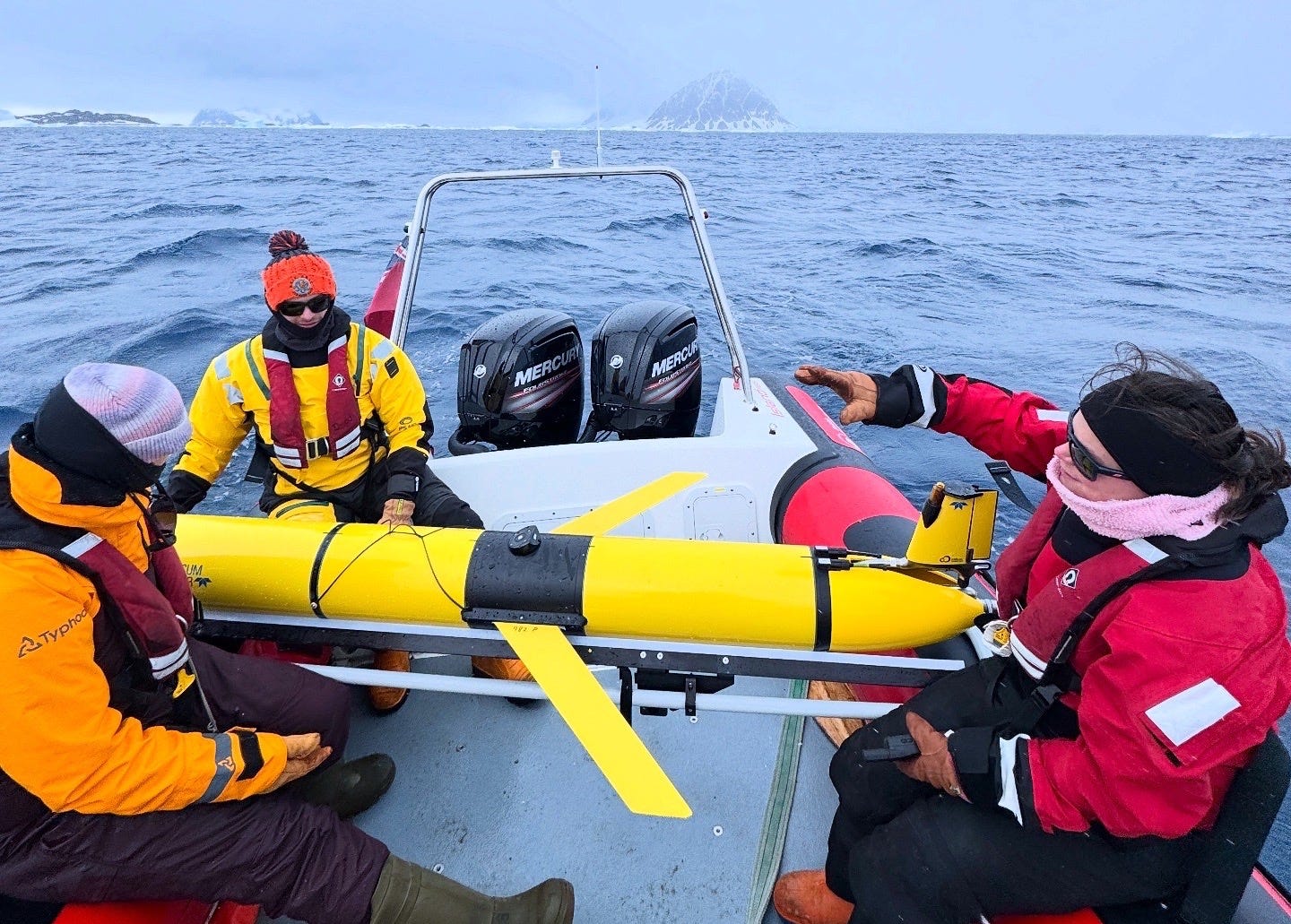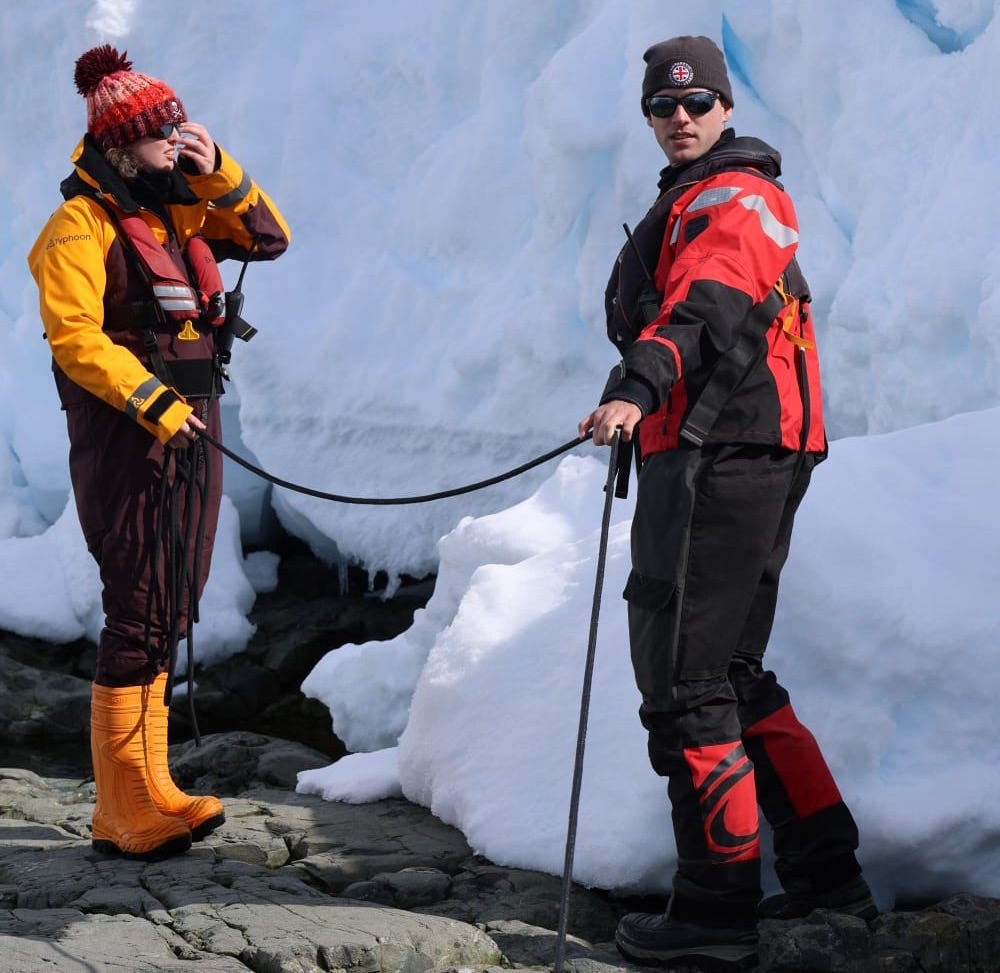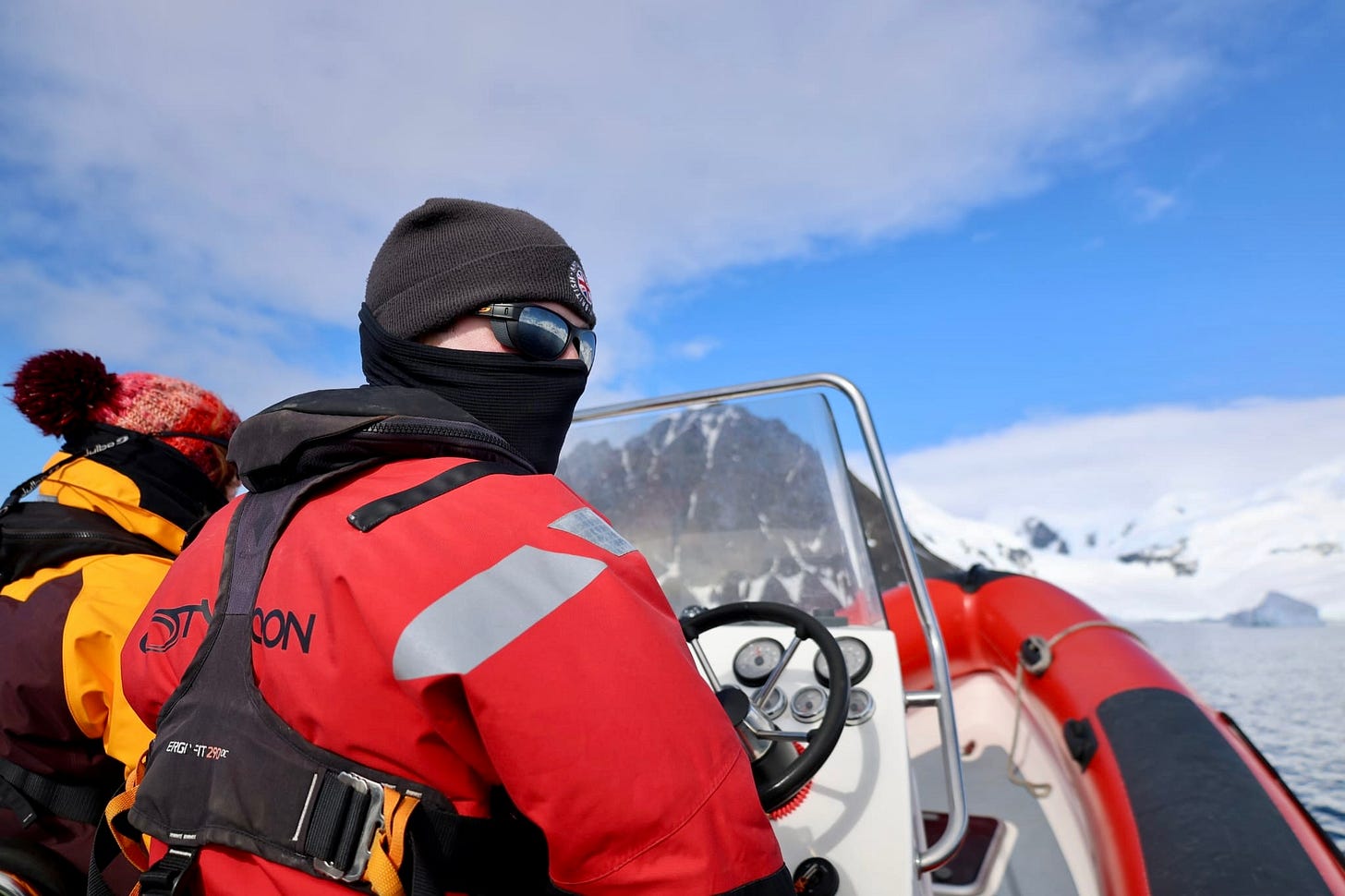How to get an Antarctic job
How to secure an 18-month contract with the British Antarctic Survey.
It’s fair to say that BAS roles are a unique posting. The variety of roles down here, and by extension the diversity of people, constantly amazes me. Everyone from the station’s doctors, tech teams, general assistants and support staff are genuinely engaged in what they do — and nearly all excited to live and work in the Antarctic. I know BAS have recently re-opened their job applications for the 2025/6 season. Here are few thoughts on my role specifically, what it involves, and what I think it takes to get a job offer.
The job description
I work as a Boating Officer at Rothera Research Station, on the Antarctic Peninsula. On paper, there’s only one Boating Officer at Rothera, but the role’s handover period means there are two of us through summer. King Edward Point (KEP) in South Georgia, the other BAS station with significant boating operations, employs two Boating Officers. They have a similar job, but it isn’t really the same. One key difference is their season lasts 11 months, mine 15.
My role, at a high level, involves taking responsibility for the boating operations down here. It splits into three main elements:
Operating the boats. On a weekly basis, I coxswain for dive operations, deploy scientific equipment, and move people around. It’s largely similar to boating in the UK, although occasionally we run into ice.
Training others on the boats. Training is required both for other members of our marine team, and for the wider station population. Boating demand (both recreational and scientific) is high in summer, and having a decent pool of people to call on to help is as welcome as it is needed.
Maintaining the fleet of boats. It isn’t easy to send a boat to a service centre from where we are. They can be ‘sent North’, but primarily we complete front-line maintenance. This involves servicing at required intervals, planned and preventative maintenance, and repairs when needed. We also service PPE, including life jackets.
On a day-to-day basis at Rothera, we will typically go out twice if conditions permit. We start early (0830 is the morning briefing) and often finish later than 1800. Dressing in and out of boat suits, and clambering up and down the wharf ladder (not to mention the cold) also takes a toll, as it is physically demanding. We don’t usually have excess energy in the evening. It is, however, common to finish the day with a great sense of achievement as uch of the science we do here is tangible. For instance, divers collecting specimens for the aquariums, video footage of feeding penguins, or returning with full water sample bottles.
Rothera boating key facts

We operate two 6m Humber RIBs, both with twin 60hp Mercury engines. These RIBs can be used for diving, but are largely used for other science, such as deployment of CTDs and water sampling. They’re also well-suited to beach landings.
We operate an additional two 7.5m Island RIBs, both with twin 115hp Command Thrust Mercury engines. These are primarily used for diving. They can also be used for recreation, and other activities benefitting from extra deck space.
All of the boats are fitted with Kevlar/metal strips on their hulls to protect from ice impacts. The underside of sponsons are reinforced where they meet the hull to minimise the likelihood of tearing or abrasion. Propellers are aluminium — they are easier to replace than internal engine parts.
Our boats aren’t coded, but are fitted with kit which largely meets or exceeds MCA requirements. The boat shed is well-stocked with spares for all of the boats, and ship calls (‘relief’) bring more in each year to keep the shelves full.
We wear dry suits all the time while on (or even near) the water. Life jackets are mandatory, obviously. Even in summer, the water temperature is sub-zero.
The boating area covers a distance of about 5 miles south of station, 2 miles East and North. This includes several islands and vast areas of glacial face. We are able to go a little further than this with special permission, but this is only for rare scientific requirements.
Ryder Bay isn’t hugely challenging to navigate, and nor do our daytime only boating operations require it, but there are a few points which could present a danger to inexperienced coxswains.
We experience influxes of brash and pack ice, and over winter the boating area is known to entirely freeze over. Our RIBs are more than capable of pushing through ice (slowly, of course), including newly formed ice sheets.
The Boating Officer (and wider marine team) is responsible for Marine Search and Rescue. On a daily basis, this often means getting the boat ‘on the hook’ (i.e. ready to launch) for certain plane movements. It could also mean effecting a full-scale rescue for another boat or island party, but fortunately this isn’t something I’ve encountered yet.
Boating Officers also lead the mooring team when ships come in. This isn’t something I had experience with prior to arriving here at Rothera, but is straightforward if well considered and approached with confidence.
Application
Getting a job with BAS involves a relatively straightforward application process. You’ll submit an application form (which mercifully doesn’t ask you hundreds of questions your CV already answers), and hopefully be asked to interview. From someone interview-inexperienced, this one didn’t seem too bad. I personally did lots of preparation with the aim of improving my interview skills, rather than technical knowledge. I was worried about what to wear (a suit felt too formal, but the usual clothes I wear for work would be way too informal), so settled for smart casual, which was absolutely fine. Questions ranged from personality and life on station, to job-focussed technical aspects.
After success at interview comes a boat handling assessment. The centre BAS contract for this are really good at communicating, so I was well prepared for what to expect on the day. Basically, it involved handling a single engine, 7m RIB, through a series of manoeuvres. The manoeuvres are similar to Powerboat Level 2, but candidates need to be more proficient than this.
I was offered the job the day after the assessment. Although I knew I would accept, I still took a couple of days to consider. Leaving the UK for 15 months didn’t feel like the sort of thing to decide on quickly.
After accepting the job
BAS contracts typically start in August. As the Boating Officer is a wintering position, the contract ends eighteen months after it begins. Three months of the job is UK-based, with a full training program to complete. BAS organise and pay for everything, so training doesn’t leave you out-of-pocket.
Pre-deployment training spans two weeks in Cambridge. It involves a whole series of talks and short courses, and is a really good opportunity to meet those who you will be living with. Winter teams go on a weekend camping trip to enable further integration.
Deployment timelines depends on the specific position. I was due to go in early-November, but travelled down by ship (most fly in), so arrived later that month. Training continues once on-site, and the Boating Officer’s handover lasts 3-4 months, in effect doubling capacity over the busiest period in Austral summer.
Meeting the criteria
You can never be entirely certain about what specifically secured the job. The requirements (when I applied) were for candidates to hold either RYA Advanced Powerboat or RYA Powerboat Instructor. As an Advanced Powerboat Instructor I felt well positioned in this aspect. My time running an RYA Training Centre demonstrated competency in professional relationships, time, and resource management.
My obvious blind spot was maintenance and repair of boats. I hold my AEC1 and have got basic experience, but nothing substantial like time in a workshop. Demonstrating logical thinking appeared sufficient to address this gap. BAS later sent me on two maintenance courses, and we have easy access to remote assistance from service centres.
I didn’t get offered the job at KEP. The good news is I had my eye on Rothera from the application anyway (I liked the look of the longer contract and dive coxswaining). I think the main reason was a relative lack of experience in jet boats, which constitute a key part of the KEP workload. If I was going to go all over again, and wanted to angle for KEP, I’d rack up some more hours in jet drives.
The best job?
Others tell me the Boating Officer’s job is the best on station. I’ve got no real reference point, as it’s the only job on station I’ve had. I’m a bit envious of the pilots, and if I had any inclination to faff around with heavy air tanks, I’d probably be jealous of the divers, too. However, I get to spend my days among wildlife, with great people, exploring the waters of Antarctica. How many people get to do that?








